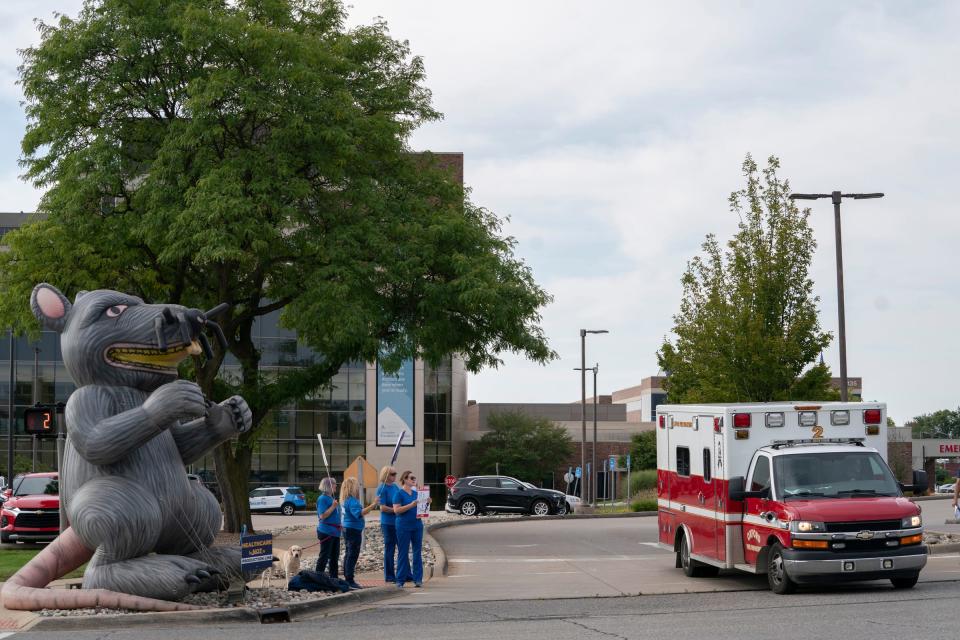Michigan hospitals, nurses clash over proposed legislation on staffing, overtime limits
About 130 Michigan hospital leaders gathered Wednesday at the state Capitol to lobby against health care legislation that would require hospitals to meet specific nurse-to-patient staffing ratios, limit mandatory overtime for nurses and require transparency about staffing — or face penalties and fines.
"While these proposed bills may be well-intended, and while they may on the surface sound like a reasonable idea, the truth is anything but," said Brian Peters, CEO of the Michigan Health and Hospital Association, which represents all 133 acute care community hospitals in Michigan.
"Our member hospitals are desperately trying to fill 8,500 open positions for registered nurses. ... If these bills were introduced and passed, in order to meet the requirements of this new mandate — an unfunded mandate, by the way — we would need to hire some 13,000 new nurses when we are already struggling to hire those 8,500 new nurses.
"This is not just a difficult task, it is an impossible task."

On the same day, the Michigan Nurses Association, which represents about 14,000 nurses statewide, launched an advertising campaign supporting the legislation, which it calls the Safe Patient Care Act — a package of three bills introduced in both the Michigan House and Senate.
Nurse: 'Hospitals are always going to put profits before patients'
"Nurses are being asked to do more with less. We're being forced to care for more patients now than we were being asked to care for before the pandemic or at times even during the pandemic," said James Walker, a registered nurse at Munson Medical Center in Traverse City and secretary of the MNA Board of Directors. "That's because of decisions that have been made by the hospitals. It's become very clear to me, personally, that hospitals are always going to put profits over patients."
Hospital executives, he said, create working conditions for registered nurses that are increasingly difficult when they cut ancillary staff such as nursing assistants, transporters and phlebotomists, while at the same boosting the patient load.
"Nurses have left the bedside because of those working conditions," Walker said. "There are 150,000 licensed nurses in the state of Michigan; only 100,000 of them are working at the bedside currently. So the nurses are out there. They just don't want to work in an environment that is unsafe for them and unsafe for their patients."
Shannon Striebich, chair of the MHA Board of Trustees and ministry president and senior vice president of operations at Trinity Health Michigan, said safe staffing "always has been a top priority" for Michigan hospitals.
"I would not say that we are trying to get out on the cheap," Striebich said. "We really want nurses. We do not have enough nurses within the state of Michigan.
"Our clinical leaders, our nursing leaders and our teams work every day ... multiple times a day, to assess patient needs with safety and quality top of mind for both staff and for patients."

Mandating nurse-to-patient ratios, Striebich said, is a one-size-fits-all approach to staffing that doesn't have the flexibility hospitals need.
"If (the legislation is) passed, there is a real and significant risk of bed closures, of extended wait times in emergency departments, of ERs having to go on diversion status, and this does not improve quality and access to care across the state of Michigan. In fact, it has quite the opposite impact."
Should this legislation become law, Peters warned, it would mean that hospitals would either have to turn away patients when the staffing ratios get too high or violate the law and pay hefty fines.
"Our hospitals would be confronting an incredibly difficult decision to either accept patients that would put them over the required staffing ratio mandate and face all kinds of financial penalties, fines, reputational damage, and ... exposure to liability or would essentially say, 'We're sorry, there's no room at the inn. You'll have to find care the next hospital,' which by the way, is going to be in precisely the same predicament," Peters said.
Scare tactics, or would hospitals have to reduce beds?
The laws also would likely lead hospitals to cut the number of beds they keep open because of they can't find enough workers to meet the requirements of the nurse-to-patient ratios to staff all available beds, he said.
The MHA estimates 5,100 hospital beds would have to close statewide, Peters said, if staffing levels remain the same and the proposed nurse-to-patient ratios are enacted.
"That's equivalent to all of the beds north of Grand Rapids and Flint, just to give you a bit of context," Peters said. "So when we talk about access to patient care, this is exactly what we're talking about."
Walker said those warnings are "scare tactics," noting that the bills wouldn't take effect immediately to give hospitals time to hire more staff. Additionally, he said, provisions within the legislation grant exceptions to the nurse-patient ratio for emergencies.
"They won't turn people away," Walker said. "If you come to the emergency room, we can't turn you away. ... What it does force (hospital leaders) to do is actually budget for safe staffing.
"Hospitals make a lot of money. If you look at McLaren (Health Care), the CEO in 2021 made $8.6 million. The money is there. It's just, where do they want to spend it? Administrative incomes are very, very high. ... It's not an unfunded mandate. It's actually investing that money into the patients."
To recruit more nurses to the state and boost the education pipeline, the MHA launched a public awareness campaign earlier this year that targets high school students and working adults considering a change of careers.
Michigan nurses: Nearly 4 in 10 say they plan to quit, new survey shows
It also is advocating for Michigan to join the national Nurse Licensure Compact, which will reduce barriers for out-of-state nurses to move to Michigan and immediately begin working in the state. The MHA also supports funding for incentives that draw students to four-year bachelor of science in nursing programs at community colleges and more.
The MHA released the results of an August poll of 600 Michigan voters conducted by Lansing-based polling company EPIC-MRA. Among the findings:
82% of Michiganders don't support a statewide nurse-to-patient ratio mandate in every hospital.
83% said they would be concerned about their ability to get hospital care or the wait times in an emergency room if the bills were to become law.
"Regardless of whether there were enough nurses to meet these new mandates, and there are not, and whether there was an unlimited supply of money to pay for them, which clearly there is not, it makes absolutely no sense in the world to replace the on-the-ground localized expertise and judgment of our hospital and nurse leaders with a one-size-fits-all, cookie-cutter mandate developed by politicians here in Lansing," Peters said. "On no planet does that make sense."
The nursing association issued its own data. In a survey of more than 9,000 Michigan nurses, a University of Michigan study found:
When mandatory overtime is used frequently, nurses are 72% more likely to leave the profession.
Nearly 40% of Michigan nurses say they plan to leave their job within the next year.
83% of currently practicing nurses say adequate staffing is their main concern.
84% of currently practicing nurses report emotional exhaustion.
"There’s a reason that 93% of polled Michigan nurses support passing the Safe Patient Care Act," Jamie Brown, president of the Michigan Nurses Association and a critical care nurse at Ascension Borgess Hospital in Kalamazoo, said in an email to the Free Press. "While health care executives have been left to make decisions about staffing levels without accountability, the quality of health care has spiraled downward.
"Forty-two percent of polled Michigan nurses report knowing of a patient death due to unsafe staffing, nearly double the number in 2016. How can hospital executives say they don’t have the ability to hire more nurses when CEOs have multimillion-dollar salaries each year? It is well documented that executives personally made millions and hospitals profited during the pandemic," the email said.
"Michigan has more than 50,000 actively licensed RNs right now who are not working at the bedside, and many say they would come back if the Safe Patient Care Act becomes law."
Contact Kristen Shamus: kshamus@freepress.com. Subscribe to the Free Press.
This article originally appeared on Detroit Free Press: Michigan hospital execs fight against nurse ratios, overtime limits
